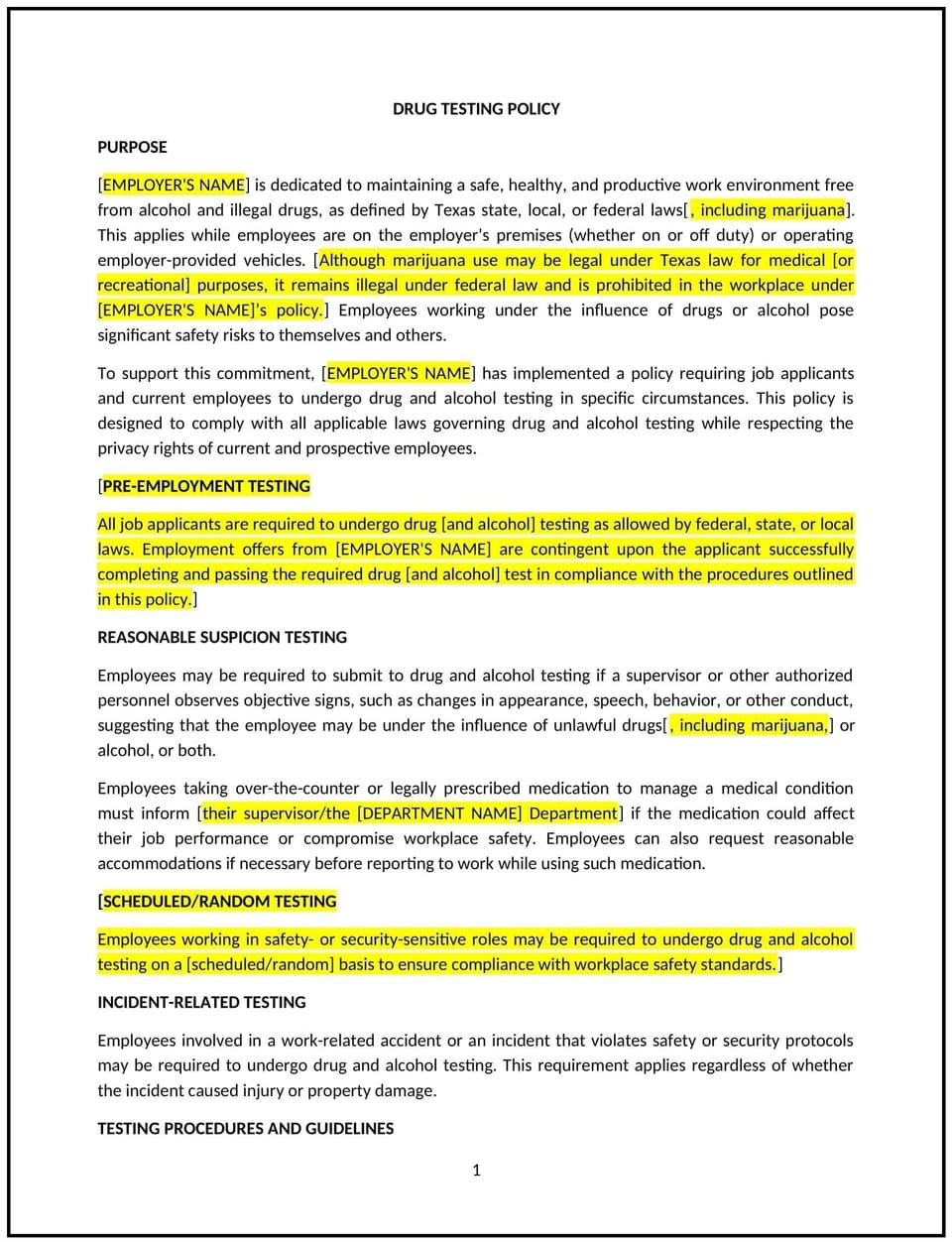Drug testing policy (Texas): Free template

Drug testing policy (Texas)
This drug testing policy is designed to help Texas businesses establish clear guidelines for conducting drug tests on employees, ensuring workplace safety, and maintaining compliance with applicable laws. Whether businesses are testing for pre-employment, random, post-accident, or reasonable suspicion, this template provides a structured approach to drug testing that protects both employees and the company.
By adopting this policy, businesses can reduce the risk of accidents, enhance compliance with federal and state regulations, and maintain a safe, productive work environment.
How to use this drug testing policy (Texas)
- Define testing procedures: Clearly specify the types of drug tests that will be conducted (e.g., pre-employment, random, post-accident, reasonable suspicion) and the methods used (e.g., urine, saliva, hair tests).
- Address testing locations and privacy: Explain where and how drug tests will be administered, ensuring privacy and confidentiality for employees during the testing process.
- Set consent requirements: Outline the process for obtaining employee consent for drug testing, including the requirement to sign a consent form before testing, and specify that refusal to submit to a drug test may result in disciplinary action or termination.
- Establish consequences for positive results: Define the consequences of a positive drug test, which may include suspension, termination, or referral to an Employee Assistance Program (EAP), depending on the severity of the situation and company policies.
- Improve compliance with state and federal laws: Make sure the policy complies with Texas state laws and federal regulations, including the Americans with Disabilities Act (ADA) and the Drug-Free Workplace Act, where applicable.
Benefits of using this drug testing policy (Texas)
This policy offers several benefits for Texas businesses:
- Ensures workplace safety: Drug testing helps reduce the risk of accidents caused by impaired employees, promoting a safer working environment for all.
- Improves productivity: By preventing drug abuse in the workplace, businesses can ensure higher levels of productivity and performance.
- Protects the company’s reputation: A clear drug testing policy shows that the business is committed to maintaining a responsible and safe workplace, which can improve the company’s reputation among employees and clients.
- Complies with legal requirements: This policy helps businesses comply with relevant Texas state laws and federal regulations related to drug testing in the workplace.
- Promotes employee well-being: Offering support through programs like EAPs and promoting a drug-free workplace can help employees avoid substance abuse and maintain their health.
Tips for using this drug testing policy (Texas)
- Communicate the policy clearly: Ensure all employees understand the drug testing policy, including when tests will be conducted, how the tests are performed, and what the consequences are for failing a test.
- Implement random testing: To reduce the likelihood of employees using drugs while at work, consider implementing a random drug testing program alongside other types of testing.
- Provide support for employees: If an employee tests positive for drugs, offer assistance through programs like Employee Assistance Programs (EAPs) to help them address substance abuse issues.
- Ensure confidentiality: Maintain strict confidentiality for all drug test results to protect employee privacy and comply with applicable laws.
- Review regularly: Update the policy periodically to reflect changes in Texas state laws, federal regulations, or industry standards regarding drug testing.
Q: When will drug testing be conducted?
A: Drug testing may be conducted at several points, including pre-employment, randomly, post-accident, or when there is reasonable suspicion of drug use. The policy should clearly define when each type of testing is applicable.
Q: What happens if an employee refuses to take a drug test?
A: The policy should specify that refusal to submit to a drug test may result in disciplinary action, including suspension or termination, depending on the company’s procedures.
Q: How are drug tests administered?
A: Drug tests may be administered through various methods, such as urine, saliva, or hair tests. The policy should specify the methods used and any third-party testing services that may be involved.
Q: What are the consequences of a positive drug test result?
A: The consequences of a positive drug test may vary, but typically include suspension, termination, or referral to an Employee Assistance Program (EAP) for further support. The policy should clearly outline the specific consequences.
Q: How often should this policy be reviewed?
A: The policy should be reviewed annually or whenever there are significant changes in Texas state laws, federal regulations, or company practices related to drug testing.
This article contains general legal information and does not contain legal advice. Cobrief is not a law firm or a substitute for an attorney or law firm. The law is complex and changes often. For legal advice, please ask a lawyer.


